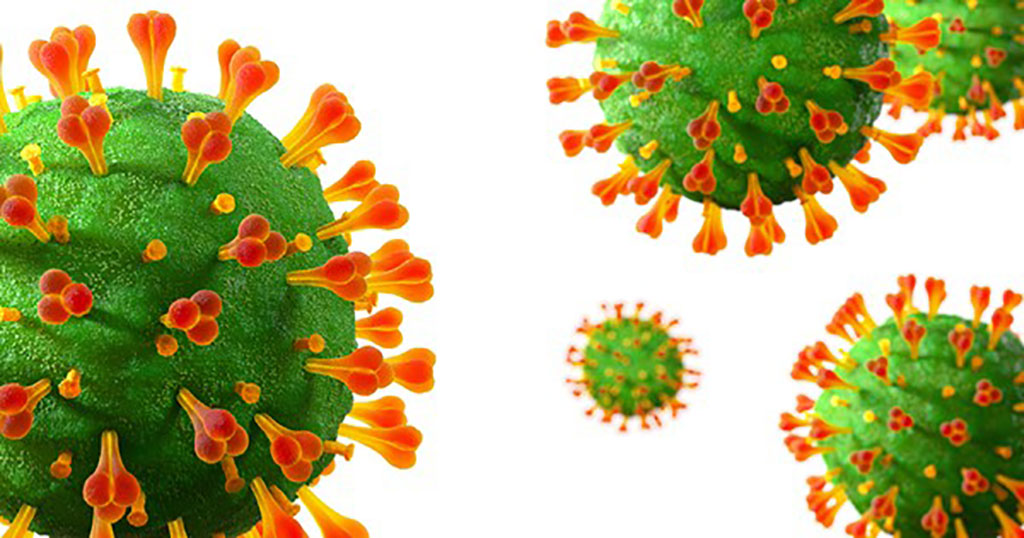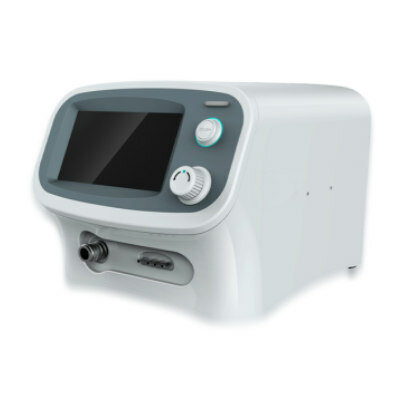GSK Collaborates with Vir Biotechnology to Find Coronavirus Solutions
|
By HospiMedica International staff writers Posted on 07 Apr 2020 |

Illustration
GlaxoSmithKline plc (London, UK) and Vir Biotechnology, Inc. (San Francisco, CA, USA) have entered into a collaboration to research and develop solutions for coronaviruses, including SARS-CoV-2, the virus that causes COVID-19. The collaboration will use Vir’s proprietary monoclonal antibody platform technology to accelerate existing and identify new anti-viral antibodies that could be used as therapeutic or preventative options to help address the current COVID-19 pandemic and future outbreaks. The companies will leverage GSK’s expertise in functional genomics and combine their capabilities in CRISPR screening and artificial intelligence to identify anti-coronavirus compounds that target cellular host genes. They will also apply their combined expertise to research SARS-CoV-2 and other coronavirus vaccines. GSK has also entered into a vaccine development agreement with China’s Xiamen Innovax Biotech which is developing a COVID-19 XWG-03 vaccine candidate technology based on a series of truncated S (spike) proteins which will be screened during the pre-clinical testing and a lead candidate will be determined by immunogenicity data. GSK will provide Innovax with its pandemic adjuvant system for preclinical evaluation of the vaccine.
Vir is a clinical-stage immunology company focused on combining immunologic insights with cutting-edge technologies to treat and prevent serious infectious diseases. Vir has assembled four technology platforms that are designed to stimulate and enhance the immune system by exploiting critical observations of natural immune processes. It has a robust method for capitalizing on unusually successful immune responses naturally occurring in people who are protected from, or have recovered from, infectious diseases. The platform is used to identify rare antibodies from survivors that have the potential to treat and prevent rapidly evolving and/or previously untreatable pathogens via direct pathogen neutralization and immune system stimulation. Vir engineers the fully human antibodies that it discovers to enhance their therapeutic potential. This platform has been used to identify and develop antibodies for pathogens including Ebola (mAb114, currently in use in the Democratic Republic of Congo), hepatitis B virus, influenza A, SARS-CoV-2, malaria, and others.
Using CRISPR-based functional genomics, computational biology and machine learning, Vir identifies key host factors necessary for a pathogen’s survival and the protective effects of the innate immune system. Vir then identifies product candidates that may be able to safely target host proteins to block pathogen replication or induce innate immunity to control infection.
Due to the urgent patient need for COVID-19 solutions, the initial focus of the collaboration between GSK and Vir will be to accelerate the development of specific antibody candidates identified by the Vir platform, VIR-7831 and VIR-7832, which have demonstrated high affinity for the SARS-CoV-2 spike protein and are highly potent in neutralizing SARS-CoV-2 in live virus-cellular assays. Subject to regulatory review, the companies plan to proceed directly into a phase 2 clinical trial within the next three to five months. The collaboration will also utilize Vir’s CRISPR screening and machine learning approach to identify cellular targets whose inhibition can prevent viral infection. Additionally, the companies have also agreed to conduct research into SARS-CoV-2 and other coronavirus vaccines by coupling GSK’s vaccines technologies and expertise with Vir’s ability to identify neutralizing epitopes that are present across entire viral families. These efforts will be additive to other initiatives GSK is advancing to develop a potential vaccine for COVID-19.
“Vir’s unique antibody platform has precedented success in identifying and developing antibodies as treatments for multiple pathogens, and it is highly complementary with our R&D approach to focus on the science of immunology. I am very excited that the talent and passion of our two companies will come together to develop solutions for multiple diseases, including the very promising antibody candidates targeting COVID-19,” said Dr. Hal Barron, Chief Scientific Officer and President R&D, GSK.
“It is becoming increasingly clear that multiple therapeutic approaches, used in combination or in sequence, will be necessary to stop this coronavirus pandemic. It is likely that the current coronavirus outbreak will not be the last. These insights are informing our scientific approach and we are pleased to join forces on the execution of this strategy with GSK, who have a like-minded R&D strategy, a deep expertise in vaccines and an impressive global reach to bring medicines to people around the world,” said George Scangos, Ph.D., CEO, Vir Biotechnology.
Related Links:
GlaxoSmithKline plc
Vir Biotechnology, Inc.
Vir is a clinical-stage immunology company focused on combining immunologic insights with cutting-edge technologies to treat and prevent serious infectious diseases. Vir has assembled four technology platforms that are designed to stimulate and enhance the immune system by exploiting critical observations of natural immune processes. It has a robust method for capitalizing on unusually successful immune responses naturally occurring in people who are protected from, or have recovered from, infectious diseases. The platform is used to identify rare antibodies from survivors that have the potential to treat and prevent rapidly evolving and/or previously untreatable pathogens via direct pathogen neutralization and immune system stimulation. Vir engineers the fully human antibodies that it discovers to enhance their therapeutic potential. This platform has been used to identify and develop antibodies for pathogens including Ebola (mAb114, currently in use in the Democratic Republic of Congo), hepatitis B virus, influenza A, SARS-CoV-2, malaria, and others.
Using CRISPR-based functional genomics, computational biology and machine learning, Vir identifies key host factors necessary for a pathogen’s survival and the protective effects of the innate immune system. Vir then identifies product candidates that may be able to safely target host proteins to block pathogen replication or induce innate immunity to control infection.
Due to the urgent patient need for COVID-19 solutions, the initial focus of the collaboration between GSK and Vir will be to accelerate the development of specific antibody candidates identified by the Vir platform, VIR-7831 and VIR-7832, which have demonstrated high affinity for the SARS-CoV-2 spike protein and are highly potent in neutralizing SARS-CoV-2 in live virus-cellular assays. Subject to regulatory review, the companies plan to proceed directly into a phase 2 clinical trial within the next three to five months. The collaboration will also utilize Vir’s CRISPR screening and machine learning approach to identify cellular targets whose inhibition can prevent viral infection. Additionally, the companies have also agreed to conduct research into SARS-CoV-2 and other coronavirus vaccines by coupling GSK’s vaccines technologies and expertise with Vir’s ability to identify neutralizing epitopes that are present across entire viral families. These efforts will be additive to other initiatives GSK is advancing to develop a potential vaccine for COVID-19.
“Vir’s unique antibody platform has precedented success in identifying and developing antibodies as treatments for multiple pathogens, and it is highly complementary with our R&D approach to focus on the science of immunology. I am very excited that the talent and passion of our two companies will come together to develop solutions for multiple diseases, including the very promising antibody candidates targeting COVID-19,” said Dr. Hal Barron, Chief Scientific Officer and President R&D, GSK.
“It is becoming increasingly clear that multiple therapeutic approaches, used in combination or in sequence, will be necessary to stop this coronavirus pandemic. It is likely that the current coronavirus outbreak will not be the last. These insights are informing our scientific approach and we are pleased to join forces on the execution of this strategy with GSK, who have a like-minded R&D strategy, a deep expertise in vaccines and an impressive global reach to bring medicines to people around the world,” said George Scangos, Ph.D., CEO, Vir Biotechnology.
Related Links:
GlaxoSmithKline plc
Vir Biotechnology, Inc.
Latest COVID-19 News
- Low-Cost System Detects SARS-CoV-2 Virus in Hospital Air Using High-Tech Bubbles
- World's First Inhalable COVID-19 Vaccine Approved in China
- COVID-19 Vaccine Patch Fights SARS-CoV-2 Variants Better than Needles
- Blood Viscosity Testing Can Predict Risk of Death in Hospitalized COVID-19 Patients
- ‘Covid Computer’ Uses AI to Detect COVID-19 from Chest CT Scans
- MRI Lung-Imaging Technique Shows Cause of Long-COVID Symptoms
- Chest CT Scans of COVID-19 Patients Could Help Distinguish Between SARS-CoV-2 Variants
- Specialized MRI Detects Lung Abnormalities in Non-Hospitalized Long COVID Patients
- AI Algorithm Identifies Hospitalized Patients at Highest Risk of Dying From COVID-19
- Sweat Sensor Detects Key Biomarkers That Provide Early Warning of COVID-19 and Flu
- Study Assesses Impact of COVID-19 on Ventilation/Perfusion Scintigraphy
- CT Imaging Study Finds Vaccination Reduces Risk of COVID-19 Associated Pulmonary Embolism
- Third Day in Hospital a ‘Tipping Point’ in Severity of COVID-19 Pneumonia
- Longer Interval Between COVID-19 Vaccines Generates Up to Nine Times as Many Antibodies
- AI Model for Monitoring COVID-19 Predicts Mortality Within First 30 Days of Admission
- AI Predicts COVID Prognosis at Near-Expert Level Based Off CT Scans
Channels
Critical Care
view channel
Ingestible Smart Capsule for Chemical Sensing in the Gut Moves Closer to Market
Intestinal gases are associated with several health conditions, including colon cancer, irritable bowel syndrome, and inflammatory bowel disease, and they have the potential to serve as crucial biomarkers... Read moreNovel Cannula Delivery System Enables Targeted Delivery of Imaging Agents and Drugs
Multiphoton microscopy has become an invaluable tool in neuroscience, allowing researchers to observe brain activity in real time with high-resolution imaging. A crucial aspect of many multiphoton microscopy... Read more
Novel Intrabronchial Method Delivers Cell Therapies in Critically Ill Patients on External Lung Support
Until now, administering cell therapies to patients on extracorporeal membrane oxygenation (ECMO)—a life-support system typically used for severe lung failure—has been nearly impossible.... Read moreSurgical Techniques
view channel
Pioneering Sutureless Coronary Bypass Technology to Eliminate Open-Chest Procedures
In patients with coronary artery disease, certain blood vessels may be narrowed or blocked, requiring a stent or a bypass (also known as diversion) to restore blood flow to the heart. Bypass surgeries... Read more
Intravascular Imaging for Guiding Stent Implantation Ensures Safer Stenting Procedures
Patients diagnosed with coronary artery disease, which is caused by plaque accumulation within the arteries leading to chest pain, shortness of breath, and potential heart attacks, frequently undergo percutaneous... Read more
World's First AI Surgical Guidance Platform Allows Surgeons to Measure Success in Real-Time
Surgeons have always faced challenges in measuring their progress toward surgical goals during procedures. Traditionally, obtaining measurements required stepping out of the sterile environment to perform... Read morePatient Care
view channel
Portable Biosensor Platform to Reduce Hospital-Acquired Infections
Approximately 4 million patients in the European Union acquire healthcare-associated infections (HAIs) or nosocomial infections each year, with around 37,000 deaths directly resulting from these infections,... Read moreFirst-Of-Its-Kind Portable Germicidal Light Technology Disinfects High-Touch Clinical Surfaces in Seconds
Reducing healthcare-acquired infections (HAIs) remains a pressing issue within global healthcare systems. In the United States alone, 1.7 million patients contract HAIs annually, leading to approximately... Read more
Surgical Capacity Optimization Solution Helps Hospitals Boost OR Utilization
An innovative solution has the capability to transform surgical capacity utilization by targeting the root cause of surgical block time inefficiencies. Fujitsu Limited’s (Tokyo, Japan) Surgical Capacity... Read more
Game-Changing Innovation in Surgical Instrument Sterilization Significantly Improves OR Throughput
A groundbreaking innovation enables hospitals to significantly improve instrument processing time and throughput in operating rooms (ORs) and sterile processing departments. Turbett Surgical, Inc.... Read moreHealth IT
view channel
Printable Molecule-Selective Nanoparticles Enable Mass Production of Wearable Biosensors
The future of medicine is likely to focus on the personalization of healthcare—understanding exactly what an individual requires and delivering the appropriate combination of nutrients, metabolites, and... Read more
Smartwatches Could Detect Congestive Heart Failure
Diagnosing congestive heart failure (CHF) typically requires expensive and time-consuming imaging techniques like echocardiography, also known as cardiac ultrasound. Previously, detecting CHF by analyzing... Read moreBusiness
view channel
Expanded Collaboration to Transform OR Technology Through AI and Automation
The expansion of an existing collaboration between three leading companies aims to develop artificial intelligence (AI)-driven solutions for smart operating rooms with sophisticated monitoring and automation.... Read more


















